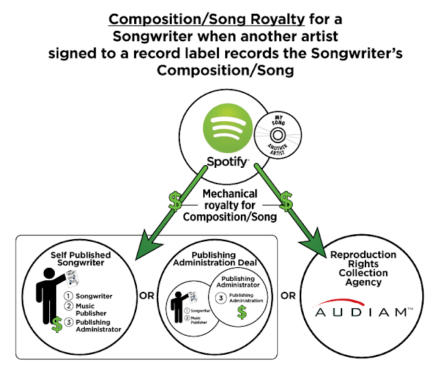Even if Spotify’s new royalty model won’t pay artists’ whose tracks don’t hit 1,000 streams in a year, songwriters will still earn money from those plays — for now, at least.
As Billboard reported last month, Spotify is planning to implement three changes to its royalty model early next year that would affect the lowest-streaming acts, non-music noise tracks and distributors and labels committing fraud. Under this new scheme, more than two-thirds of the tracks uploaded to that platform will be eligible to receive royalties — but that, notably, that will only impact about 0.5% of the royalty pool.
Nevertheless, this has sparked debate around the music community, with some questioning the ethics of not paying artists for whatever streams they garnered simply because they were not popular enough. Others supported the plan, citing the paltry sums an artist would be making for under 1,000 annual streams anyway (which amounts to about five cents). Many also believe this new rule could provide alleviate the issue of the royalty pool being divided among the exponentially-growing number of songs on Spotify’s platform, which likely dilutes the amount of money flowing to career artists.
But this change to Spotify’s royalty model does not affect songwriters and publishers payments at all, a source close to the company confirmed to Billboard. It just affects those who are involved in the master recording copyright.
For the uninitiated, there are two copyrights associated with every song released: the underlying musical work (often also called the “composition” or “song”) copyright, which protects the lyrics and melodies written by songwriters, and the master recording (also called the “sound recording”) copyright, which protects the artists’ one specific recording of that musical work.
In the United States, the royalty rates that songwriters and publishers can charge for the composition side of things are controlled by a government entity known as the Copyright Royalty Board. Every five years, the statutory rate structure for songwriters and publishers is renegotiated with the National Music Publishers’ Association (NMPA) as well as Nashville Songwriters Association International (NSAI) and other groups and individuals who represent the music industry’s fight to raise rates. (Other territories often base their publishing royalty rates off of those set in the U.S.)
Not everyone agrees on what specific rate structure they want, which has led to some infighting, but they all unite behind one principle: songwriters should earn more money. In fact, publishing earns just a fraction what the recorded music side does on streaming overall, the rates are far from equal. Many in the music business wish the current Copyright Royalty Board system could be abolished, freeing songwriters and publishers to negotiate rates in a free market without government interference, but this is unlikely to change, given it would require an act of Congress to overhaul an over one hundred year old law and services, many of which are owned by some of the world’s largest technology companies, would certainly lobby against it.
Those whose interests lie on the recording side, like record labels, get to negotiate directly with streaming services to set their royalty structure. This is why the streaming payment system can be experimented with in the ways seen now through Spotify’s recent changes, as well as Deezer’s new “artist-centric” payment plan, created with UMG. Overall, the publishing side of the business is handcuffed to whatever the current ruling says.
The system of streaming royalty payments for publishers and songwriters for 2023-2027 (also known as “phonorecords IV” “phono IV” or “CRB IV”), the current five year period, has already been set. National Music Publishers’ Association president and CEO David Israelite says it is possible that the next five year period, phono V, could be reconfigured to more closely mirror what is happening on the master recording side but that determination process won’t begin until about early 2026.
“We will have the benefit of watching how this plays out for a while before we ever have to address it, but it’s way too early to speculate what we might do,” says Israelite. Still, he adds, “it is horrible that we are locked in the statutory rate structure where we have no flexibility other than these five year windows but that is our situation… It’s a very different conversation than one company sitting down with another company and agreeing what they want to do [like it happens on the master side]. We are asking a court through litigation or an agreement to set a structure that applies to everyone and to build consensus around that. It’s much harder to change.”
https://www.billboard.com/pro/does-spotify-new-royalty-model-affect-songwriters/


